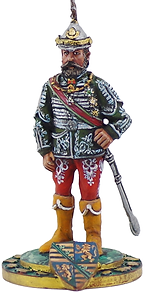top of page


Austro-Hungarian Monarchy

Indivisibly and Inseparably

Wilhelm
Karl Urach

Johann
von Salis-Seewis

Emich von Leiningen

Alfred III Windisch-Grätz

Cardinal Johannes
Katschthaler

One of Europe's major powers at the time, Austria-Hungary was geographically the second-largest country in Europe and the third-most populous (after Russia and the German Empire). The Empire built up the fourth-largest machine-building industry in the world. With the exception of the territory of the Bosnian Condominium, the Empire of Austria and the Kingdom of Hungary were separate sovereign countries in international law. At its core was the dual monarchy, which was a real union between Cisleithania, the northern and western parts of the former Austrian Empire, and Transleithania (Kingdom of Hungary). Following the 1867 reforms, the Austrian and Hungarian states were co-equal in power. The two countries conducted unified diplomatic and defence policies. For these purposes, "common" ministries of foreign affairs and defence were maintained under the monarch's direct authority, as was a third finance ministry responsible only for financing the two "common" portfolios. A third component of the union was the Kingdom of Croatia-Slavonia, an autonomous region under the Hungarian crown, which negotiated the Croatian–Hungarian Settlement in 1868. After 1878, Bosnia and Herzegovina came under Austro-Hungarian joint military and civilian rule. Anxious about Balkan instability and Russian aggression,
and to counter French interests in Europe, Austria–Hungary forged a defensive alliance with Germany in October 1879 and in May 1882. In October 1882 Italy joined this partnership in the Triple Alliance largely because of Italy's imperial rivalries with France. Tensions between Russia and Austria–Hungary remained high, so Bismarck replaced the League of the Three Emperors with the Reinsurance Treaty with Russia to keep the Habsburgs from recklessly starting a war over Pan-Slavism. The deaths of Franz Joseph's brother, Maximilian (1867), and his only son, Rudolf, made the Emperor's nephew, Franz Ferdinand, heir to the throne. The Archduke was rumoured to have been an advocate for the trialism as a means to limit the power of the Hungarian aristocracy.
bottom of page











